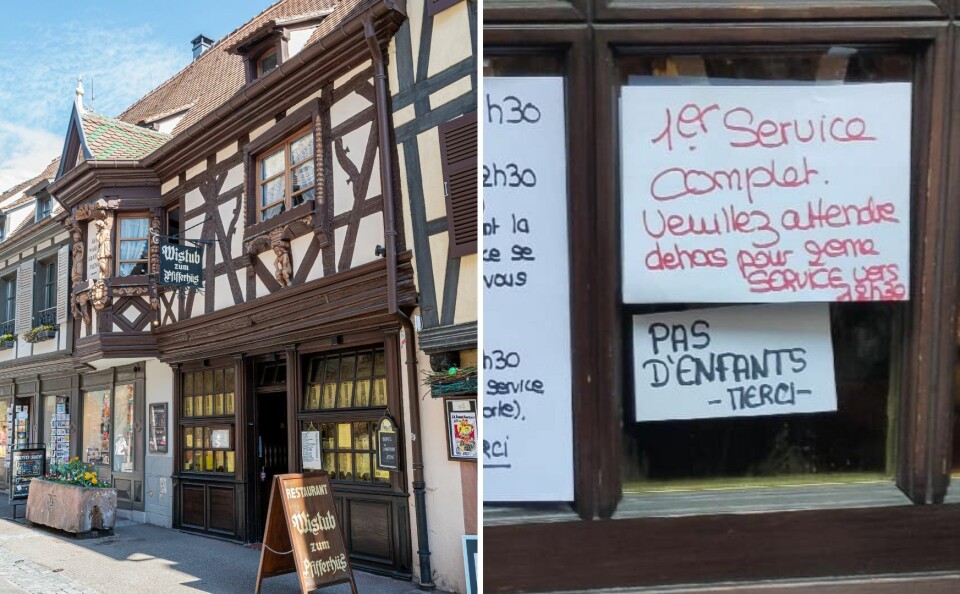-
Tipping in France: Are card machine tip requests going too far?
Payment terminals increasingly ask if customers want to pay an extra amount
-
The chaos on France's ski slopes is so sad, says retired instructor
Reader says she refused to teach children not wearing safety gear
-
Where to find good Indian food and curry ingredients in rural France
Connexion readers share their tips on finding spices that hit the spot
‘French restaurant 'no children' sign was wrong - use common courtesy’
Commentator Nabila Ramdani gives her view on an Alsace restaurant’s communication policy

Ask any restaurateur what the worst part of their business is, and most will reply with two words: rude customers.
They do not differentiate between types – aggressive, nasty people come in all shapes and sizes, and, to misquote Jean-Paul Sartre, all of them can be hell.
This truism has come into sharp focus after a celebrated winstub – a traditional dining house in the eastern Alsace region of France – posted an abrupt note on its front door reading: “No children, thank you”.
Read more: ‘No children please’ restaurant provokes anger in French tourist town
There was fury and claims of discrimination at the Michelin-recommended Winstub Zum Pfifferhüs in Ribeauvillé, particularly from parents who were visiting the pretty market town in freezing cold December and hoping for some warmth, as well as decent food.
In tears when asked to leave
There is nothing particularly sophisticated about the Zum Pfifferhüs menu.
On the contrary, the emphasis is on large sausages, roast potatoes and – as with all restaurants on France’s border with Germany – lashings of sauerkraut.
In which case, it would be logical to assume that kids were welcome.
This was certainly the feeling of one outraged client, who said her shocked family, which included a couple of youngsters, were in tears when they were asked to leave, having not seen the sign on the door telling children to stay away.
The woman was so outraged that she even threatened to go to the police, or at least make a civil complaint to the judicial authorities.
Read more: Travel France from your kitchen: Choucroute garnie recipe
Why not just deal with bad behaviour?
The good news for such complainants is that it is illegal for a restaurant to refuse clients because of the presence of children, just as they cannot be turned away for their race or religion.
In this case, the Zum Pfifferhüs owners admitted it was only unruly children they were interested in barring, and not those who sit quietly and eat their food.
In which case, why didn’t they just let everybody in, and only take action if there was clear evidence of genuinely bad behaviour?
Communication mistake
Alsatian winstubs are about fine wine as much as food, and there is no doubt that excess alcohol is what normally causes customers to disgrace themselves.
If somebody has had too much to drink, ask them to leave, and if a child is being similarly obnoxious, then do the same.
The truth is that most restaurants now have everything necessary to keep children happy, not least colouring books and boxes full of crayons or felt-tip pens.
Nobody likes to see a child concentrating intensely on an electronic device showing cartoons all the time, but this is, of course, an easy way of maintaining tranquillity too.
Perhaps Zum Pfifferhüs’s biggest mistake was one of communication.
The handwritten ‘No children’ sign on the door was almost impossible to see, and thus likely to have been ignored by those entering.
Being excluded from anywhere is always unpleasant, but when rejection comes unexpectedly and in front of other diners, then the hurt and humiliation are intensified.
Zum Pfifferhüs did acknowledge this in the end, and removed the sign.
It is about common courtesy
‘Adults only’ restaurants have an almost seedy ring to them, but legitimate ones do exist in various parts of the world, as do ‘adults only’ hotels (including in France).
They make it very clear in all their sales literature, and their booking procedures, that they offer a mature ambience, ideally suited for romance or business.
It isn’t because they don’t like children, it’s simply that they can guarantee there will be no crying babies, or restless toddlers racing around.
It’s all about common courtesy – if everybody can be clear about it, then there is absolutely no reason for anger.
Related articles
MAP: France’s most welcoming towns and villages
Locals clash over win as crowds flock to France's favourite village
























